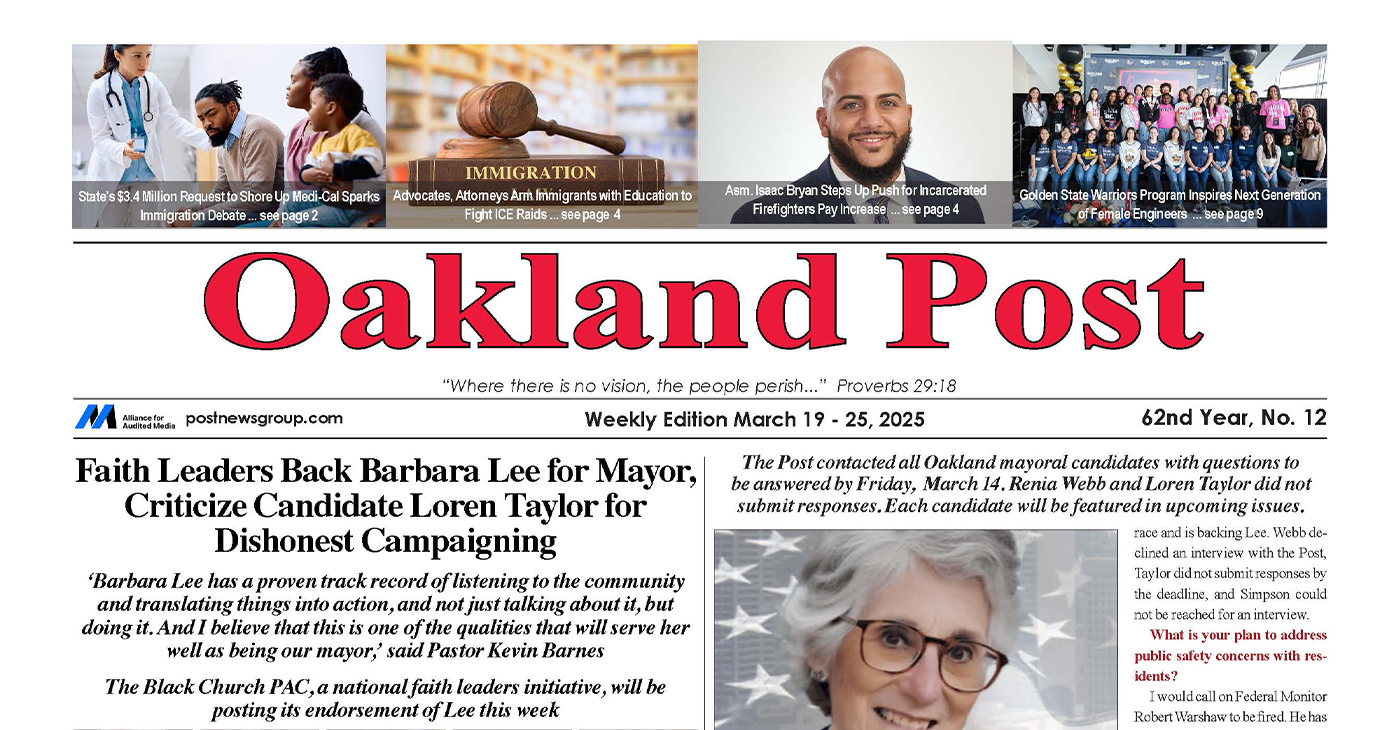Crime
Local Filmmakers Explore Meaning of Oakland’s First Fridays
A monthly art walk is probably the last place most people would expect a shooting to occur, but in Oakland last February, that is exactly what happened.
After a young man’s death at “First Friday”, where art lovers crowd the sidewalks and often enjoy food and wine at local galleries, two filmmakers decided to make a movie about the gathering in the hopes of starting a dialogue about the many facets of life in Oakland.
One the one hand, the East Bay city was recently listed as one of America’s top five places to visit by the New York Times, but it’s also considered the third most violent city in America—with more than 100 murders —according to the FBI.
“People only see one thing of Oakland, but we want to produce something that’s more than what you see on the news,” said N’Jeri Eaton, one of the filmmakers, who wants to show there is more to Oakland than headline grabbing crime.
The “First Friday” film takes a look at how the event went from being a small art gathering to a citywide festival that attracts nearly 20,000 people each month — where Kiante Campbell, 18, was shot and killed after getting into a confrontation with a group of young people. Three others were wounded.
As a result of the February shooting, the event that once went from 14th to 27th street was scaled back to a smaller area — from 27th Street to West Grand Avenue. The event was also scheduled to end at 9 p.m., two hours earlier than before.
Eaton is no stranger to tackling crime stories. She produced a film that looked at the 2009 killing of four police officers from the perspective of the shooter, Lovelle Mixon.
The film showed how some in the community felt the shooter was justified because of tension with the city’s police department.
For “First Friday,” Eaton teamed up with Mario Furloni, whom she met at U.C. Berkeley’s Graduate School of Journalism a few years ago.
Rather than looking into the murder or the investigation, the filmmakers hope to spark a conversation about the social issues facing Oakland.
Furloni said that the film follows a diverse group of people who are working to preserve an event that has become a reflection of the cultural and economic realities in Oakland.
First Friday organizers are facing tough financial problems and the future of the event is uncertain. In June, organizers received the last chunk of public funding they will get from the city.
Although that money covers the cost of the July 5 event, it’s unclear what will happen after that. Organizers must find ways to pay for private security to secure future events.
Eaton believes that organizers are still trying to find the right balance of safety and control without watering down the event.
The film was shot a week before First Friday in March. Eaton says shrines and other memorabilia were still on the streets paying homage to shooting victim Kiante Campbell.
Eaton says she was inspired by the new movie “Fruitvale Station,” which uses the story of Oscar Grant, a man shot by BART police in 2009, to tell a deeper story about the people and the community of Oakland.
Eaton says, “The movie [‘Fruitvale Station’] has opened up a dialogue about Oakland, and I hope our movie does the same.”
The documentary is scheduled for release next year. Until then, Eaton and Furloni are working to finish producing the film. In August, a fundraiser will be held at Somar Bar in Oakland. For more information, visit www.kickstarter.com/projects/firstfridayfilm/first-friday-film.
Activism
Oakland Post: Week of March 28 – April 1, 2025
The printed Weekly Edition of the Oakland Post: Week of March 28 – April 1, 2025

To enlarge your view of this issue, use the slider, magnifying glass icon or full page icon in the lower right corner of the browser window.
Activism
Group Takes First Steps to Recall District Attorney Diana Becton
The group, called “Recall Diana Becton,” says they have lost faith in her prosecution decisions and her lack of transparency. On their social media post, they say: “We the victims of crime, their families, local business owners and employees, as well as residents of Contra Costa County, have reached our limit and are initiating the recall of District Attorney Diana Becton,” the notice states. “We are increasingly concerned about the persistent cycle of unaddressed criminal activity. We are frustrated by her continuous empty promises to victims and their families that justice will prevail while she permits criminals to roam free.” Becton, 73, is a former judge who was appointed district attorney in 2017 by the Board of Supervisors and then won election in 2018 and again in 2022.

By Post Staff
After gathering more than 100 verified signatures, a group led by crime victims delivered a ‘notice of intent’ to the offices of Contra Costa County District Attorney Diana Becton seeking her recall.
The group, called “Recall Diana Becton,” says they have lost faith in her prosecution decisions and her lack of transparency.
On their social media post, they say:
“We the victims of crime, their families, local business owners and employees, as well as residents of Contra Costa County, have reached our limit and are initiating the recall of District Attorney Diana Becton,” the notice states.
“We are increasingly concerned about the persistent cycle of unaddressed criminal activity. We are frustrated by her continuous empty promises to victims and their families that justice will prevail while she permits criminals to roam free.”
Becton, 73, is a former judge who was appointed district attorney in 2017 by the Board of Supervisors and then won election in 2018 and again in 2022.
Becton has seven days to respond. According to the East Bay Times, her office spokesperson said her “answer will be her public comment.”
After Becton responds, according to the Contra Costa County Elections Office, Recall Diana Becton must then finalize the petition language and gather signatures of a minimum of 10% of registered voters (72,000) in 160 days before it can go on the ballot for election.
She is the third Bay Area district attorney whose constituents wanted them removed from office. San Francisco District Attorney Chesa Boudin was removed from office in 2021 and last year, Pamela Price lost her position in a recall election.
Of the top 10 proponents of Becton’s recall, three are the families of Alexis Gabe, Thomas Arellano, and Damond Lazenby Jr.
In each of those cases, the families say Becton failed to pursue prosecution, allowed a plea deal instead of a trial in a slaying and questioned the coroner’s report in a fatal car crash.
Some political science experts suggest that, in the Bay Area there may be a bit of copycat syndrome going on.
In many states, recalls are not permitted at all, but in California, not only are they permitted but the ability to put one into motion is easy.
“Only 10% of registered voters in a district are needed just to start the process of getting the effort onto the ballot,” Garrick Percival, a political science professor told the East Bay Times. “It makes it easy to make the attempt.”
But according to their website, the Recall Diana Becton group express their loss of faith in the prosecutor.
“Her lack of transparency regarding crime in this county, and her attempts to keep her offenders out of jail have left us disheartened,” the recall group wrote.
Petitioners say they are acting not just for themselves but other crime victims “who feel ignored, exasperated and hopeless in their pursuit of justice for themselves or their loved ones.”
KRON TV, The East Bay Times, and Wikipedia are the sources for this report.
Activism
Oakland Post: Week of March 19 – 25, 2025
The printed Weekly Edition of the Oakland Post: Week of March 19 – 25, 2025

To enlarge your view of this issue, use the slider, magnifying glass icon or full page icon in the lower right corner of the browser window.
-

 #NNPA BlackPress4 weeks ago
#NNPA BlackPress4 weeks agoTarget Takes a Hit: $12.4 Billion Wiped Out as Boycotts Grow
-

 Activism4 weeks ago
Activism4 weeks agoUndocumented Workers Are Struggling to Feed Themselves. Slashed Budgets and New Immigration Policies Bring Fresh Challenges
-

 #NNPA BlackPress4 weeks ago
#NNPA BlackPress4 weeks agoBREAKING Groundbreaking Singer Angie Stone Dies in Car Accident at 63
-

 Arts and Culture4 weeks ago
Arts and Culture4 weeks agoBeverly Lorraine Greene: A Pioneering Architect and Symbol of Possibility and Progress
-

 Activism3 weeks ago
Activism3 weeks agoOakland Post: Week of March 5 – 11, 2025
-

 #NNPA BlackPress1 week ago
#NNPA BlackPress1 week agoRev. Dr. Jamal Bryant’s Black Church Target Boycott Mobilizes 150,000
-

 #NNPA BlackPress4 weeks ago
#NNPA BlackPress4 weeks agoTrump Moves to Dismantle Education Department
-

 #NNPA BlackPress3 weeks ago
#NNPA BlackPress3 weeks agoFighting to Keep Blackness















































